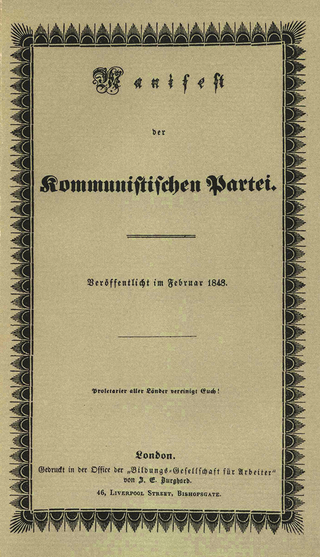
Karl Marx was a German-born philosopher, political theorist, political economist, historian, sociologist, journalist, and revolutionary socialist. His best-known works are the 1848 pamphlet The Communist Manifesto and his three-volume Das Kapital (1867–1894); the latter employs his critical approach of historical materialism in an analysis of capitalism, in the culmination of his intellectual endeavours. Marx's ideas and their subsequent development, collectively known as Marxism, have had enormous influence on modern intellectual, economic and political history.
Socialism is an economic and political philosophy encompassing diverse economic and social systems characterised by social ownership of the means of production, as opposed to private ownership. It describes the economic, political, and social theories and movements associated with the implementation of such systems. Social ownership can take various forms, including public, community, collective, cooperative, or employee. As one of the main ideologies on the political spectrum, socialism is considered as the standard left-wing ideology in most countries. Types of socialism vary based on the role of markets and planning in resource allocation, and the structure of management in organizations.

The Communist Manifesto, originally the Manifesto of the Communist Party, is a political pamphlet written by Karl Marx and Friedrich Engels, commissioned by the Communist League and originally published in London in 1848. The text is the first and most systematic attempt by Marx and Engels to codify for wide consumption the historical materialist idea that "the history of all hitherto existing society is the history of class struggles", in which social classes are defined by the relationship of people to the means of production. Published amid the Revolutions of 1848 in Europe, the manifesto remains one of the world's most influential political documents.

Karl Marx's theory of alienation describes the separation and estrangement of people from their work, their wider world, their human nature, and their selves. Alienation is a consequence of the division of labour in a capitalist society, wherein a human being's life is lived as a mechanistic part of a social class.

Alexander Theodore Callinicos is a Rhodesian-born British political theorist and activist. An adherent of Trotskyism, he is a member of the Central Committee of the Socialist Workers Party (SWP) and serves as its International Secretary. Between 2009 and 2020 he was the editor of International Socialism, the SWP's theoretical journal, and has published a number of books.

Paul Mattick Sr. was a German-American Marxist political writer, political philosopher and social revolutionary, whose thought can be placed within the council communist and left communist traditions.

Ralph Miliband was a British sociologist. He has been described as "one of the best known academic Marxists of his generation", in this manner being compared with E. P. Thompson, Eric Hobsbawm and Perry Anderson.
"Wage Labour and Capital" was an 1847 lecture by the critic of political economy and philosopher Karl Marx, first published as articles in the Neue Rheinische Zeitung in April 1849. It is widely considered the precursor to Marx's influential treatise Das Kapital. It is commonly paired with Marx's 1865 lecture Value, Price and Profit. Previously, Marx had been studying political economy; evidence of this being his unpublished Economic and Philosophic Manuscripts of 1844 and The Poverty of Philosophy in France in 1847.
Hal Draper was an American socialist activist and author who played a significant role in the Berkeley, California, Free Speech Movement. He is known for his extensive scholarship on the history and meaning of the thought of Karl Marx.
A general strike is a strike action in which participants cease all economic activity, such as working, to strengthen the bargaining position of a trade union or achieve a common social or political goal. They are organised by large coalitions of political, social, and labour organizations and may also include rallies, marches, boycotts, civil disobedience, non-payment of taxes, and other forms of direct or indirect action. Additionally, general strikes might exclude care workers, such as teachers, doctors, and nurses.
The socialist mode of production, also known as socialism or communism, is a specific historical phase of economic development and its corresponding set of social relations that emerge from capitalism in the schema of historical materialism within Marxist theory. The Marxist definition of socialism is that of production for use-value, therefore the law of value no longer directs economic activity. Marxist production for use is coordinated through conscious economic planning. According to Marx, distribution of products is based on the principle of "to each according to his needs"; Soviet models often distributed products based on the principle of "to each according to his contribution". The social relations of socialism are characterized by the proletariat effectively controlling the means of production, either through cooperative enterprises or by public ownership or private artisanal tools and self-management. Surplus value goes to the working class and hence society as a whole.

The International Workingmen's Association, often called the First International, was a political international which aimed at uniting a variety of different left-wing socialist, social democratic, communist, and anarchist groups and trade unions that were based on the working class and class struggle. It was founded in 1864 in a workmen's meeting held in St. Martin's Hall, London. Its first congress was held in 1866 in Geneva.

In the history of Belgium, the period from 1789 to 1914, dubbed the "long 19th century" by the historian Eric Hobsbawm, includes the end of Austrian rule and periods of French and Dutch rule over the region, leading to the creation of the first independent Belgian state in 1830.
Revolutionary socialism is a political philosophy, doctrine, and tradition within socialism that stresses the idea that a social revolution is necessary to bring about structural changes in society. More specifically, it is the view that revolution is a necessary precondition for transitioning from a capitalist to a socialist mode of production. Revolution is not necessarily defined as a violent insurrection; it is defined as a seizure of political power by mass movements of the working class so that the state is directly controlled or abolished by the working class as opposed to the capitalist class and its interests.
In Marxist philosophy, the dictatorship of the proletariat is a condition in which the proletariat, or working class, holds control over state power. The dictatorship of the proletariat is the transitional phase from a capitalist to a communist economy, whereby the post-revolutionary state seizes the means of production, mandates the implementation of direct elections on behalf of and within the confines of the ruling proletarian state party, and institutes elected delegates into representative workers' councils that nationalise ownership of the means of production from private to collective ownership. During this phase, the organizational structure of the party is to be largely determined by the need for it to govern firmly and wield state power to prevent counterrevolution, and to facilitate the transition to a lasting communist society.

The Socialist Party of Great Britain (SPGB) is a socialist political party in the United Kingdom. Founded in 1904 as a split from the Social Democratic Federation (SDF), it advocates using the ballot box for revolutionary purposes and opposes both Leninism and reformism. It holds that countries which claimed to have established socialism had only established "state capitalism" and was one of the first to describe the Soviet Union as state capitalist. The party's political position has been described as a form of impossibilism.

Utopian socialism is the term often used to describe the first current of modern socialism and socialist thought as exemplified by the work of Henri de Saint-Simon, Charles Fourier, Étienne Cabet, and Robert Owen. Utopian socialism is often described as the presentation of visions and outlines for imaginary or futuristic ideal societies, with positive ideals being the main reason for moving society in such a direction. Later socialists and critics of utopian socialism viewed utopian socialism as not being grounded in actual material conditions of existing society. These visions of ideal societies competed with revolutionary and social democratic movements.
Karl Friedrich Schapper was a German socialist and labour leader. He was one of the pioneers of the labour movement in Germany and an early associate of Wilhelm Weitling and Karl Marx.
The history of socialism has its origins in the Age of Enlightenment and the 1789 French Revolution, along with the changes that brought, although it has precedents in earlier movements and ideas. The Communist Manifesto was written by Karl Marx and Friedrich Engels in 1847-48 just before the Revolutions of 1848 swept Europe, expressing what they termed scientific socialism. In the last third of the 19th century parties dedicated to Democratic socialism arose in Europe, drawing mainly from Marxism. The Australian Labor Party was the first elected socialist party when it formed government in the Colony of Queensland for a week in 1899.
Events in the year 1869 in Belgium.










